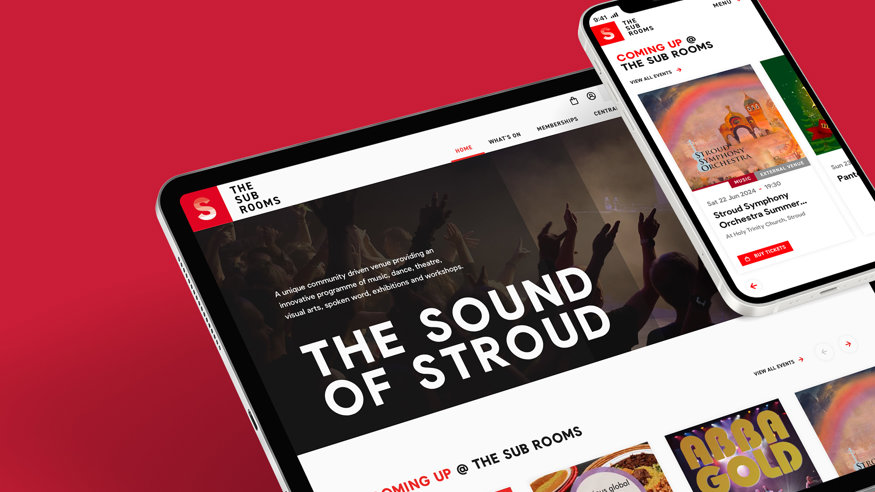Website builders vs bespoke: which is right for your business?

In a digital-first world, a company’s website (and its overall effectiveness) is of paramount importance, serving as both the first impression and initial introduction to a brand.
Traditionally built from the ground up by experienced developers, website creation has become increasingly accessible, primarily due to the rise of website builders such as Squarespace, Wix, Weebly, and Webflow. These platforms offer powerful tools, sleek templates, and rapid setup options, without the need for direct developer involvement. However, for businesses with more complex or unique requirements, they can be limiting, with many instead opting for bespoke development tailored to the specific project goals, workflows, and user experience.
So, how do these two approaches compare? This blog outlines the pros and cons of each – off-the-shelf website builders vs bespoke development.
Website builders: the convenience kings
With increased accessibility and user-friendly design, platforms like Squarespace, Wix, Weebly, and Webflow have revolutionised the way websites are designed and built, empowering individuals and businesses to create professional-looking sites without the need for extensive technical knowledge or developer input.
These tools have significantly lowered the barrier to entry for web design - offering intuitive interfaces, customisable templates, and fast deployment however they do come with limitations - with an overview of both the benefits and drawbacks detailed below:
Benefits of website builders
Speed & simplicity: drag and drop interfaces, pre-designed templates, and guided wizards mean sites can be built quickly and efficiently, without developer involvement
Cost-effective: affordable subscription tiers provide hosting, security, and support, making them ideal for start-ups and/or side hustles
All-in-one ecosystems: all-inclusive packages are available, providing everything from domain names to SEO tools, without the need for third-party plugins or servers
Regular updates & security: website builders can handle technical maintenance, patching, and security removing the need for technical knowledge
Ideal for small sites: with minimal setup and fast deployment, builders are perfect for primarily static content, e.g. portfolio, blog, and brochure sites.
What are the drawbacks?
Template limitations: customisation is limited, with many sites following the same if not similar templates
Performance bloat: website builders often use extra code and scripts which can negatively impact both load speed and SEO
Less flexibility for growth: integrating custom features, databases, or user-specific functionality is difficult, if not impossible - often leading to clunky, patchwork solutions
Ownership concerns: Building on a third-party platform means being subject to their rules—if the policies change, adaptation is required.
Bespoke development: tailored for you
A bespoke build is a custom-developed solution specifically tailored to meet the unique goals, workflows, and technical requirements of a particular project. In contrast to off-the-shelf solutions, it is designed from the ground up to align precisely with the client’s vision, offering complete flexibility in functionality, design, and integration—without the limitations, constraints, or compromises typically imposed by generic platforms.
Benefits of a bespoke build
Total flexibility: every feature, field, and flow is designed around your business, without having to force processes into a templated solution
Optimised performance: lightweight code, custom architecture, and streamlined assets are likely to lead to faster load times and better SEO performance
Scalable & future-proof: a bespoke system is designed to evolve alongside website requirements and business needs
Unique brand experience: designers and developers work together to craft a user experience that’s not only 100% on-brand but also completely unique
Complete ownership: ability to retain full control over the code, content, and strategic direction of the brand and its digital presence.
Things to consider
Higher upfront cost: bespoke sites require planning, design, and development, often resulting in a higher initial investment
Longer timelines: custom work takes time, with project timelines taking anything from several weeks to months to go from idea to launch
Ongoing maintenance: a technical team or partner will be required to manage updates, security, and performance over time.
Comparison table
Final thoughts
If you're launching a blog, portfolio, or simple business website, website builders like Squarespace, Wix, Weebly, and Webflow are a great way to get online quickly and affordably.
However, if you’re a business with unique requirements, high traffic expectations, or plans for long-term digital growth, a bespoke CMS and website is an investment that pays dividends in flexibility, performance, and brand integrity.
Ultimately, the right choice depends on your goals, budget, and vision - one offers ease and speed, the other power and precision.
Interested in hearing more?
Need help deciding or developing a bespoke solution? We'd love to talk about how a custom approach can bring your digital vision to life.
Share article:

2026 | Digital trends and predictions
Based on current trends and developments across the digital landscape, predictions suggests that 2026 will be shaped less by new technologies and more by how mature ones are applied— primarily driven by embedded AI, simpler digital experiences, evolving search behaviour, and rising expectations around privacy and trust. This blog explores the key areas where these shifts will be most visible.
Read more
2025 16i Christmas opening hours
Please note our hours will be slightly different during the holidays.
Read more
SGGBA 2025: Winners revealed
Congratulations to the winners of the SoGlos Business Awards 2025! Find out who they are!
Read more
Upgrading to Umbraco 17: a strategic investment for your business
Used and trusted by both developers and marketers, Umbraco offers a high level of customisability, with the latest long-term-supported (LTS) version (Umbraco 17) currently scheduled for release in November 2025. Featuring improved performance and developer tooling, alongside support for the latest .NET versions, Umbraco 17 offers a number of benefits including enhanced security, streamlined workflows, and improved scalability.
Read more
How to avoid website project horror stories!
Maybe you've been there before, maybe this is your first time creating a website. We have seen website projects at all stages turn from dreams into nightmares very easily, often being the ones at the other end helping our soon to be clients put it back on the right path.
Read more
Exploring the benefits of Umbraco 17: a leap forward in CMS flexibility and performance
Umbraco has long held the reputation as a flexible, developer‑friendly content management system (CMS) and with the release of Umbraco 17 scheduled for November 2025, the platform is continuing to evolve. Umbraco 17 will be the next Long‑Term Support (LTS) version, aligned with the upcoming .NET 10 LTS release, and is expected to include enhancements in performance, developer experience, and content workflow modernisation.
Read more
The future is bright for the Sub Rooms
New website and Spektrix integration helped Sub Rooms turn a corner
Read more
How to spot a text message, iMessage or WhatsApp scam
Top 6 red flags for suspicious text messages
Read more